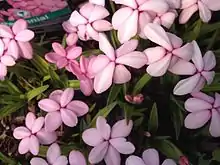Rhodohypoxis baurii
Rhodohypoxis baurii, the red star or rosy posy, is a species of flowering plant in the family Hypoxidae that is native to damp meadows in eastern South Africa.[1][2] Growing to no more than 10 cm (3.9 in) tall and broad, it is a herbaceous perennial with lanceolate, sharply folded, hairy grey-green leaves, and pale or deep pink star-shaped flowers throughout summer. The upturned flowers are held on slender, short straight stalks. The tepals are of equal length and held alternately in two ranks.[1]
| Rhodohypoxis baurii | |
|---|---|
 | |
| Scientific classification | |
| Kingdom: | Plantae |
| Clade: | Tracheophytes |
| Clade: | Angiosperms |
| Clade: | Monocots |
| Order: | Asparagales |
| Family: | Hypoxidaceae |
| Genus: | Rhodohypoxis |
| Species: | R. baurii |
| Binomial name | |
| Rhodohypoxis baurii (Baker) Nel | |
The specific epithet baurii is named for Reverend L. R. Baur (1825-1889), who collected Rhodohypoxis in South Africa.[3]
Cultivation
It prefers a peaty, acid soil which stays reliably moist in summer but dries out in winter to ensure a suitable dormant period. The necessary conditions may be achieved in a pot or trough, or by planting it in peat pockets. Propagation is by seed or division. Many cultivars have been developed for ornamental garden use. Most are larger-flowered and more vigorous than the species. Cultivar names include ‘Apple Blossom’, ‘Dawn’, ‘Emily Peel’ and ‘Susan Garnett-Bottfield’.[2]
Rhodohypoxis baurii has gained the Royal Horticultural Society’s Award of Garden Merit.[4][5]
References
- Hogan, Sean, chief consultant. 2003, 2004. "Flora A Gardener's Encyclopedia", Global Nook Publishing Pty Ltd, Timber Press. ISBN 0881925381. pp. 1202
- Brickell, Christopher "The Royal Horticultural Society A-Z of Garden Plants", 3rd ed. Copyright 1996, 2003, 2008 Dorling Kindersley Ltd., London. ISBN 9781405332965 pp. 901
- Gledhill, David (2008). "The Names of Plants". Cambridge University Press. ISBN 9780521866453 (hardback), ISBN 9780521685535 (paperback). pp 67, 209, 331
- "RHS Plantfinder - Rhodohypoxis baurii". Retrieved 8 October 2018.
- "AGM Plants - Ornamental" (PDF). Royal Horticultural Society. July 2017. p. 87. Retrieved 8 October 2018.